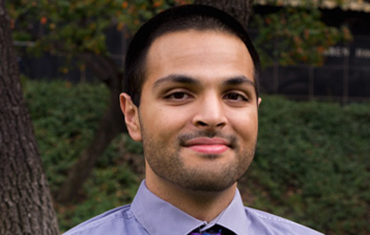
Pictured: Arif Musa
A cross-sectional study of spine surgeons' attitudes regarding the management of preoperative anxiety in patients shows that the concern often goes overlooked, despite the majority of those scheduled to undergo surgery experiencing that stress.
Wayne State University School of Medicine student Arif Musa surveyed 69 spine surgeons from the organization AO Spine North America, sending them an anonymous survey online to capture their views.
"I learned that 65.7 percent did not assess pre-operative anxiety formally. However, they held surgeons, followed by anesthesiologists and patients, to be most responsible to manage anxiety," said Musa, a Class of 2022 medical student. "Most respondents felt that educating the patient about the procedure would limit anxiety, but spine surgeons also endorsed other methods, such as family presence, familiarization with the facility and visits from the anesthesiologist."
The survey also showed that no consensus guideline to manage anxiety exists. Musa suggested in his abstract that future research should explore a possible preoperative anxiety measurement scale and management protocol specific to spine surgery.
"These findings demonstrate the spine surgeons prefer to discuss pre-operative anxiety if raised by the patient and believe that patient education is the best way to control anxiety. They also hold themselves most responsible to manage their patients' anxiety while also acknowledging the role of anesthesiologist and patients themselves," he said.
Musa proposed the project in September 2016 and completed the first phase the summer of 2018.
The results are included in the journal Clinical Spine Surgery.
Musa is the main author on the abstract, with input from faculty in anesthesiology, psychiatry, orthopedic surgery and neurological surgery.
"Conducting clinical research as a student-investigator allowed me to apply what I was learning in medical school while developing critical skills in research design, grant writing, manuscript preparation and teamwork, which will surely serve me well in my future career as a physician," he said. "As a student, I was also able to gain invaluable mentorship, work alongside like-minded faculty and students, and apply my knowledge to improve the care of patients despite still being in medical school."
Musa has presented the findings at meetings of the Society for Minimally Invasive Spine Surgery, the American Society of Anesthesiologists and the United States Psychiatric Congress.
After establishing the Office for Medical Student Research in June 2017, Wayne State University has shown a commitment to "encouraging and supporting scholarly endeavors among its student doctors. I hope to be part of a new tradition at the Wayne State University School of Medicine that prioritizes medical research and provides protected time for research activities," he said.